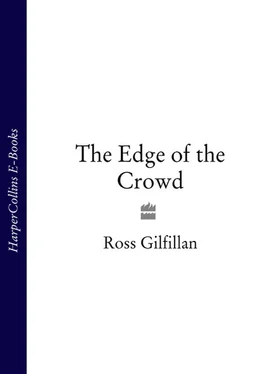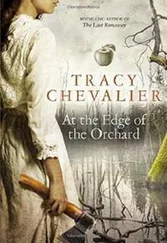For once, backgrounding is important. His customers will pay today’s high rate only if the photograph associates them with the fabulous edifice. But between the lens and the all-important background are desultory strollers, boys with hoops and vendors of various comestibles. He wishes them vanished. Rankin would also prefer that the visitors examining the exhibits outside the building – a monolithic slab of coal, an assortment of heaped raw materials for use in industry and the biggest ship’s anchor Rankin has seen – would take themselves inside. But humankind is not to be avoided today: all about are people of every station and exotic tint. It is hard to remember, and at this moment even more difficult to believe, that a two-minute exposure will entirely eliminate from the scene everything that is in motion.
Rankin pitches the dark-tent under an elm tree and into this he installs a brass-cornered and felt-lined box of lenses. Beside the box he places his dishes, scales, weights, funnels, glass measures and a large supply of glass plates. He sends a boy to fill a pail from the Serpentine and now needs only the heavy chest, in which are contained bottles of chemicals for coating, sensitising, developing and fixing of the glass negatives. He exits the tent and begins to drag the trunk towards the tailboard of the wagon. ‘I ain’t shifting the chemicals by myself,’ he calls to Touchfarthing, who stands shaded by the great elm. ‘I shan’t answer if the box gets dropped.’
Touchfarthing, sipping from a bottle of ginger beer and watching riders upon Rotten Row, makes no reply.
‘What you’ll have is a box of broken glass and spilt chemicals,’ says Rankin, louder. ‘And it won’t be my fault.’
But Touchfarthing only indicates a pair of riders who have broken into a dangerous canter, sending a small boy and girl fleeing from their path. ‘Look there,’ he says. ‘That’s Lord Montague mounted on the roan. With Arthur Vavasour. Well, well! Do you know that when last I saw them they were hardly speaking?’
‘No, I didn’t know that,’ says Rankin, shortly. He purses his lips and drums his fingers on the chest containing chemicals.
‘I had their acquaintance at Sibthorpe, you know,’ Touchfarthing says, complacently.
Rankin whistles through his teeth and rolls his blue eyes. ‘When you’re ready, guv’nor,’ he says, managing with some difficulty to move the box unaided by the other man.
Touchfarthing approaches the camera as a maestro his piano forte. By separating himself from Rankin and the labours of preparation, it has been made clear to onlookers that it is Touchfarthing who is the artist; and Rankin who is very much ‘school of’.
Touchfarthing signals with a ringed finger and Rankin invites the first subject, a well-fed gentleman with a single bushy eyebrow and luxuriant red whiskers, to sit upon a chair. As discreetly as possible, he quietly points out the advantages of a larger photograph frame, of additional prints or of a special patent backing which is guaranteed to prevent fading, before he solicits a shilling and retires to the rope, beyond which interested onlookers have now formed themselves into an orderly queue. Touchfarthing, shrouded by the great black cloth, removes the lens cover and raises his right arm. Eyebrow and whiskers are still as death and eternity seems to pass before the photographer drops his hand and re-covers the lens. The business of the day has commenced.
Rankin must now confine himself to the dark-tent, the conjuror’s cloak under which some magic must be performed before the sorcerer’s apprentice can re-emerge with his subjects’ captured and framed likenesses on the day they visited the Great Exhibition. And it might as well be alchemy to Touchfarthing too. This collodion process is so new that Rankin alone has attempted its mastery and even he has doubts concerning its use on such an important occasion. But Touchfarthing has proved intransigent, insisting that only the very latest method is appropriate for use at the Great Exhibition of All Nations.
With Rankin engaged, Touchfarthing is obliged to attend to the subjects. Before he carefully constrains them in their chairs he will compliment and flatter them or bamboozle them with the science of photography. This, he hopes, will divert attention from the transaction itself, the part of the business Touchfarthing loathes. It is, after all, the transfer of cash that distinguishes the grubbing tradesman from the pioneering amateur.
The ordeal over, he again addresses the camera into which Rankin has inserted a new wet plate and under whose black cloth he buries his head from view. Flattened into two dimensions is how Touchfarthing prefers to view his run-of-the-mill clients. On the ground-glass screen their hats and their ‘physogs’, their arms and their torsos become mere compositional elements to be arranged in the most pleasing and aesthetic manner. By correcting poor posture, rearranging slack attire and encouraging a sober expression, Touchfarthing considers that he improves on life.
The afternoon passes away. Never has either man worked so hard at the business of photography nor encompassed such a bewildering variety of subjects from every place and of every station: couples from Clapham; families up from Kent; Midlands industrialists; richly-attired visitors from the sub-continent; a fidgeting band of Neapolitan musicians; mechanics and farmers; curates and choristers; sailors on shore leave; the recruiting sergeants, now merrily drunk; Etonians and Harrovians and a class of National school children, the eyes of whose teacher pierce the lens so fiercely that Touchfarthing almost trembles.
The photographer finds this multiplicity repellent: skilled physician follows lowly apothecary as if there were no order in the world. And perhaps this is a singular occasion but no one seems to take offence at such an unnatural commingling of society. Touchfarthing whispers to the busy Rankin, ‘Dear me, where is the quality here?’
Touchfarthing would rather maintain distance from the common man and upstart alike. This last taxonomy he most detests. Rankin has tired long ago of Touchfarthing’s declamations on these ‘self-made counter-jumpers’ who ‘dress like kings and talk like coal-heavers’, but the process is slow and while Rankin is in and out of the dark-tent changing and processing plates, there is little that Touchfarthing can do to avoid unwanted intimacy with hoi polloi and he is further dismayed to discover among his sitters a tendency towards self-publicity.
Mr Hector Trundle, as he tolerates Touchfarthing fussing about his disarrayed neck-wear, announces that he might buy up any of the exotic exhibits he has seen displayed within ‘they great glass walls’. He might load up a caravan with power looms and steam hammers and such practical improvements; he might choose the finest satins and silks for his wife (for whom he had a handkerchief passed through the fountain of Eau de Cologne); and should he so desire, it would be within his power to buy up a whole array of novelties: the eighty-bladed pen-knife, the stiletto umbrella, the tableaux of small and expertly stuffed animals. With the possible exception of that Koh-i-Noor diamond, he might slap cash on the table and haul the whole lot back to Salford, Lancashire. In fact, he might do anything he likes except that which this minute he desires most in all the world and that is to scratch his nose.
Jasper Munro considers the Great Exhibition ‘a damnable mess’. He sits erect, his hands folded over a silver-topped cane that he has pegged into the earth while Touchfarthing fastens a collar stud and brushes dust from his shoulders. ‘Poor classifying, that’s what it is,’ he is saying. ‘No idea of proper categorisation. I saw how it would be from the start, when the Prince announced his intentions. How can you “wed high art with mechanical skill” and avoid an unholy mess? Crystal and fine porcelain here, greasy, thumping steam engines there. It’s a fiasco.’
Читать дальше












